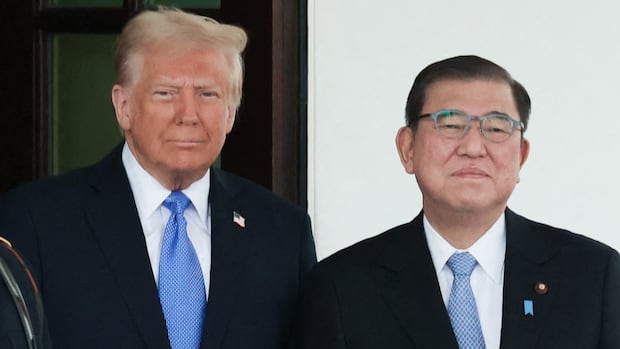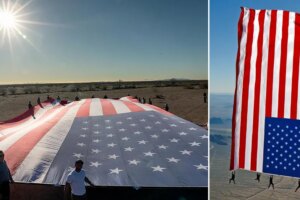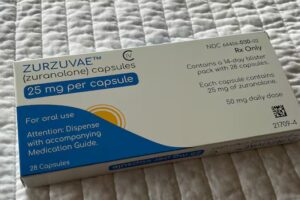
U.S. President Donald Trump on Tuesday said the U.S. and Japan have struck a deal that will lower the hefty tariffs Trump had threatened to impose on goods from its Asian ally while extracting commitments for Japan to invest $550 billion US in the United States and open its markets to American goods.
The agreement — including a 15 per cent tariff on all imported Japanese goods, down from a proposed 25 per cent — is the most significant of the string of trade deals the White House has reached ahead of an approaching Aug. 1 deadline for higher levies to kick in.
“This is a very exciting time for the United States of America, and especially for the fact that we will continue to always have a great relationship with the Country of Japan,” Trump said on his Truth Social platform.
Industry and government officials briefed on the agreement said the deal also lowers the tariff to 15 per cent from 25 per cent on Japanese autos, which account for more than a quarter of all the country’s exports to the U.S.
Trump’s announcement followed a meeting with Japan’s top tariff negotiator, Ryosei Akazawa, at the White House on Tuesday, according to a person familiar with the matter.
“#Mission Complete,” Akazawa wrote on the social media platform X.
Ryosei Akazawa, right, Japan’s economic revitalization minister, is shown with U.S. Treasury Secretary Scott Bessent, left foreground, at Expo 2025 in Osaka, Japan, on Saturday. (Kim Kyung-Hoon/Reuters)
North American automakers raise alarm
Two-way trade between the two countries totalled nearly $230 billion US in 2024, with Japan running a trade surplus of nearly $70 billion US. Japan is the fifth-largest U.S. trading partner in goods, U.S. Census Bureau data shows.
The announcement sent stocks in Japan higher, led by big gains in automakers. Honda, Toyota and Nissan all gained eight per cent or more, and U.S. equity index futures gained ground. The yen strengthened against the American dollar.
But U.S. automakers signalled their unhappiness with the deal, raising concerns about a trade regime that could cut tariffs on auto imports from Japan to 15 per cent while leaving tariffs on imports from Canada and Mexico at 25 per cent.
Matt Blunt, who heads the American Automotive Policy Council, which represents General Motors, Ford and Chrysler-parent company Stellantis, said that “any deal that charges a lower tariff for Japanese imports with virtually no U.S. content than the tariff imposed on North American-built vehicles with high U.S. content is a bad deal for U.S. industry and U.S. autoworkers.”
Newly manufactured cars await export at a port in Yokohama, Japan. Word the U.S. deal would lower the tariff on Japanese auto imports to 15 per cent while leaving tariffs on imports from Canada and Mexico at 25 per cent caused concern for North American automakers. (Issei Kato/Reuters)
Reuters could not immediately confirm the elements of the deal announced by Trump, and details were scant. The White House did not immediately respond to a request for additional details.
Speaking early on Wednesday in Tokyo, Japanese Prime Minister Shigeru Ishiba said he had received an initial report from his trade negotiator in Washington but declined to comment on the specifics of the negotiation.
Ishiba is under intense political pressure in Japan, where the ruling coalition was set back by losing control of the upper house in an election on Sunday.
He said he couldn’t say how a trade deal would affect his decision on whether to step down from office until he saw the details.
Announcement follows Trump pattern
Trump’s announcement on Tuesday was of a pattern with some previous agreements. He announced the deal on social media shortly after a meeting or a phone call with a foreign official, leaving many key details a mystery — and before the other country issued its own proclamations.
Nearly three weeks after Trump announced an agreement with Vietnam — in similar fashion — no formal statement has been released by either country spelling out the particulars of the deal that was ostensibly reached.
LNG joint venture
Speaking later Tuesday evening at the White House, Trump also expressed fresh optimism that Japan would form a joint venture with the U.S. to support a gas pipeline in Alaska long sought by his administration.
“We concluded the one deal … and now we’re going to conclude another one because they’re forming a joint venture with us at, in Alaska, as you know, for the LNG,” Trump told lawmakers at the White House. “They’re all set to make that deal now.”
Japanese officials had initially doubted the practicality of the project but warmed to it — and a range of other investments dear to Trump — as a potential incentive to resolve trade disputes with Washington.
Trump aides are feverishly working to close trade deals ahead of an Aug. 1 deadline that the president has repeatedly pushed back under pressure from markets and intense lobbying by industry. By that date, countries are set to face steep new tariffs beyond those Trump has already imposed since taking office in January.
While Trump has said that unilateral letters declaring what rate would be imposed are tantamount to a deal, his team has nonetheless raced to close agreements. Trump has announced framework agreements with Britain, Vietnam, Indonesia and paused a tit-for-tat tariff battle with China, though details are still to be worked out with all of those countries.
At the White House, Trump said negotiators from the European Union would be in Washington on Wednesday.





